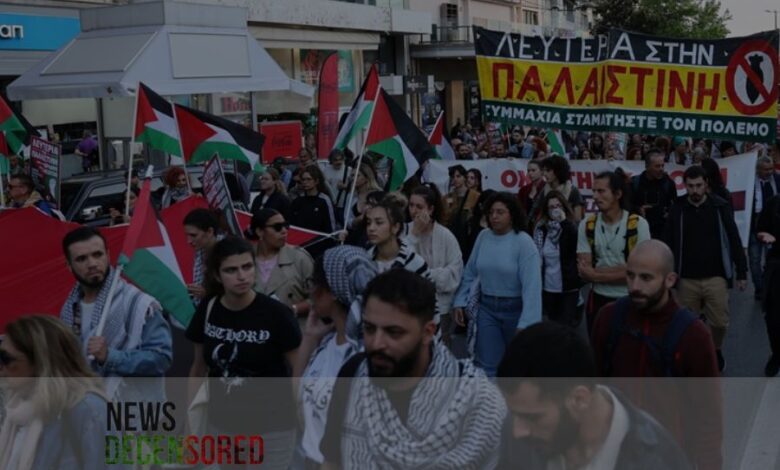At least 9 students are facing deportation orderS from Greece after taking part in the Gaza protest

Nine people from the UK and EU member states face deportation from Greece days after they took part in a protest in solidarity with Palestine at a Greek university.
Greek police arrested 28 people during a protest and sit-in at Athens Law School on May 14 on charges including disturbing the peace, damaging property, and trespassing, as well as violations of gun and torch laws, all of which he denies.
Among those detained, the nine UK and EU citizens were classified as “undesirable aliens” and considered a threat to public order and national security. They also faced deportation in an unusual move by the authorities.
The lawyers representing the nine non-Greek protesters say they will appeal their deportation at their trial scheduled in Athens on Tuesday. In a statement, they asked whether the right to freedom of movement of European citizens “applies only to tourists and investors and is suspended in the event of political action, especially if the matter concerns Palestine.
According to them, the arrested protesters are currently being held in the Amygdaleza detention center outside Athens in “deplorable conditions” and without “interpreters.”
In a statement, the nine non-Greek detainees said they suddenly found themselves in a deportation processing center after they were told they would be transferred to another police station for document examination.
They described the decision to deport them as “the most severe punishment” that the state could impose “for the crime” of being inside a university, adding that “this fragile and bold reaction by the Greek state still pales in its horror when viewed in international law.”
The context of the very reason for the occupation of the university: genocide.”
In response to the recent arrests and protests at universities, Prime Minister Kyriakos Mitsotakis, leader of the right-wing New Democracy party, which has been in power since 2019, said on the day of the arrests that the authorities would not allow universities to become sites of protest against the Israeli war on Gaza as we have seen in countries around the world.
In 2019, the Mitsotakis government removed decades-old legislation preventing security services from entering university campuses. This law was drawn up following a decision by the military dictatorship, which ruled from 1967 to 1974, to violently break up a historic student protest against the government by storming the gates of the Athens Polytechnic in 1973 using force.
It is estimated that around two dozen people died in the ensuing crackdown, and the protest is often seen as a critical moment in the dictatorship’s eventual fall in 1974.
Israeli Prime Minister Benjamin Netanyahu welcomes his Greek counterpart, Kyriakos Mitsotakis, in Jerusalem on October 23, 2023.
“Axis” for Israel:
The arrests and risk of deportation from Greece come amid a series of similar threats that pro-Palestinian student demonstrators have faced in other Western countries.
In early May, the UK revoked the visa of Dana Abu Qamar, a law student at the University of Manchester, over comments she made at a protest demonstration last year, which many saw as a celebration of the Hamas attack on Israel on October 7, in which 1,139 people were killed. People and about 250 others were captured.
And in the United States, where students at universities across the country have led camps demanding that their universities divest from companies with ties to Israel, protesters have been arrested, putting them at risk of possible deportation.
However, Sotiris Roussos, a professor at the Department of Political Science at the University of Peloponnese, said that Greece has taken a pro-Palestinian stance compared to the UK and the US.
Roussos said Greece was among the last European countries to officially recognize Israel as a state, a position stemming from the country’s reliance on Arab powers following the 1974 Turkish invasion of Cyprus.
Former Prime Minister Andreas Papandreou, who was in power during most of the 1980s, also enjoyed a close relationship with Yasser Arafat, the former leader of the Palestine Liberation Organization.
However, Roussos says that since the 2000s, Greece has adopted a more pro-Israel policy. “This strategic shift—you can call it a pivot—towards Israel is due to Greece’s belief that Israel, Cyprus, and Greece can form an alliance in the eastern Mediterranean,” Roussos said.
Mitsotakis, who was re-elected last year, has consistently expressed support for Israel’s right to defend itself in accordance with international law. He met with Prime Minister Benjamin Netanyahu in Jerusalem shortly after October 7 and called him a “true friend .”
We stand at this point where this government believes that if it stands firmly with the Israelis and the Americans, it will increase Greece’s defensive capacity against Turkey,” Roussos said.
However, despite Greece’s current political stance, there appears to be growing support for the Palestinian cause, especially among Greek youth.
You can feel that there is an increase in sympathy for the Palestinians and the Palestinian state,” Roussos said. Since October 7, there have been protests in the streets of Athens and other parts of Greece in support of Palestine.
On May 17, Yanis Varoufakis, former Greek Finance Minister and Secretary General of MeRA25, a left-wing political party, said in a statement that the administrative detention and deportation of the nine non-Greek citizens was “unprecedented” and called for their extradition. The Greek police did not respond to Al Jazeera’s request for comment at the time of publication.




